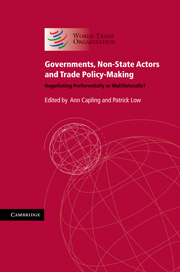Book contents
- Frontmatter
- Contents
- List of figures and tables
- List of contributors
- Acknowledgements
- Disclaimer
- Introduction
- 1 The domestic politics of trade policy-making: state and non-state actor interactions and forum choice
- 2 Chile
- 3 Colombia
- 4 Mexico
- 5 Indonesia
- 6 Thailand
- 7 Jordan
- 8 Kenya
- 9 South Africa
- 10 The influence of international non-state actors in multilateral and preferential trade agreements: a question of forum shopping?
- 11 Main findings and conclusions
- Index
- References
9 - South Africa
Published online by Cambridge University Press: 05 July 2014
- Frontmatter
- Contents
- List of figures and tables
- List of contributors
- Acknowledgements
- Disclaimer
- Introduction
- 1 The domestic politics of trade policy-making: state and non-state actor interactions and forum choice
- 2 Chile
- 3 Colombia
- 4 Mexico
- 5 Indonesia
- 6 Thailand
- 7 Jordan
- 8 Kenya
- 9 South Africa
- 10 The influence of international non-state actors in multilateral and preferential trade agreements: a question of forum shopping?
- 11 Main findings and conclusions
- Index
- References
Summary
Introduction
Trade policy-making is a complex affair. In all countries a host of factors influence the outcome, with the mix varying according to domestic circumstances and the relationship of the country concerned with the global economy. As the introductory chapter of this book attests, strictly state-centric explanations regarding how trade policy decisions are made are no longer sufficient in a world where international trade negotiations increasingly impinge on domestic policies. Therefore, a nuanced understanding of how trade policy is made is required, and must interrogate the roles of non-state actors (NSAs), institutions and ideas, and their interactions with each other, in shaping preferences and policy.
This chapter explores those issues in the context of South Africa. Section 2 provides a brief historical overview of South Africa’s trade policy history; section 3 reviews the broad patterns of the country’s external trade. From this history and structural analysis it is clear that the early preference for liberalization in the post-1990 period has recently given way to a more defensive approach to trade policy and negotiations, which are now regarded as subordinate to sector-based industrial policy. This shift reflects a broader shift within the African National Congress-led tripartite alliance concerning the role of liberalization in economic policy; in other words, the ideological basis for trade policy shifted in the early years of this decade in response to perceived shortcomings of the liberal model. However, as section 4 charts, the institutional arrangements within the state have not really changed much. Furthermore, as section 5 elaborates, the executive branch retained its dominance of the trade policy-making process throughout this period in relation to NSAs in particular. In other words, the ideological shift in trade policy has not yet been matched by institutional changes through which particular interests are expressed.
- Type
- Chapter
- Information
- Governments, Non-State Actors and Trade Policy-MakingNegotiating Preferentially or Multilaterally?, pp. 249 - 283Publisher: Cambridge University PressPrint publication year: 2010
References
- 3
- Cited by



